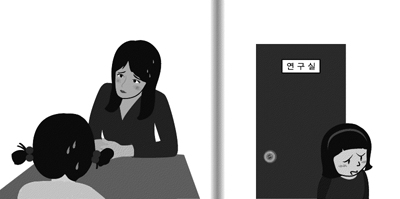
“I don’t visit my professor because I usually handle questions that I do not know on my own,” said Kim Hae-mi (Psychology, 3). “In addition, professors seem to be very busy, so I feel like I’m bothering them if I visit their offices.”
According to statistics complied by The Professors Times, 52.9 percent of 1,080 university students and 43.8 percent of 361 professors at Korea University, Kyung Hee University, Yonsei University, Chung-Ang University and Hanyang University answered that they have problems communicating with each other.
Nearly 43.4 percent of the students replied that they do not even meet their professors once a month outside of class to communicate with. Also, most of those who answered that they regularly visit professors said the conversation usually ends within five minutes.
Professors suggested the generation gap as the biggest reason for difficulties in communication with students, while students indicated the biggest reason as a lack of time since the professors are often busy when not lecturing.
“I was disappointed to see my recommendation letter, which requires a lot of interest and attention, being written in merely 10 minutes, especially when the professor met me 15 minutes after the appointment should have begun,” Kim Shin-sung (Kyungwon University, 2) said. “I think my advisor did not have time because of the research.”
Other barriers to communication between professors and students included: no opportunity for a meeting, professors’ authoritarian attitude toward students, and different ways of thinking or topics limited just to seeking jobs and getting good grades from professors.
Even though such barriers are apparent, students say talking with professors is necessary.
”Undergraduates have less chance to receive care from others in college, compared to their high school years,” said Min Ji-young (Law, 4). “Just like many other undergraduates, I did not visit my professor often. However, by having a conversation with professors, I felt like I was being cared. We shared stories about carrer, worries, and even marrige, which made us easily develop a bond of sympathy,” Min said.
Universities and professors are learning to put effort into setting up events to break down the barriers to communication between professors and students. The president and professors of Sookmyung Women’s University personally distributed snacks to students during the exam period to encourage communication with them. In Ewha, the Accreditation Board for Engineering Education of Korea (ABEEK) provides a mandatory counseling program from professors to students taking the ABEEK course, to improve mutual understanding between them. Also, the Department of Economics held “Meetings with our professors” in May as an event where professors and students could gather together. Last semester, professor Vladimir Hlasny (Economics) participated in this event even though he did not have any students of his own to advise.
“Since I am a freshman, the Freshmen Seminar classes were the only way for me to meet professors personally, other than taking their classes,” Seo Min-jee (Social Science, 1) said. “But thanks to the event, I was able to receive detailed, personal advice on deciding my career from professor Hlasny. It was a very useful time for me.”
“Professors are sometimes thought of as just ‘talking heads,’ who give formal lectures and formal answers to questions, and who will not understand students’ actual concerns,” professor Hlasny said.
“Informal meetings can change this perception, because professors can then talk about other topics. We can encourage students to pursue unique college experience and life, and inspire them to do more of creative thinking.”
The relationship between professors and students can be strengthened when it extends beyond class, and this can start with a one-to-one talk.
“Advising students has great importance for me. However, students tend not to seek guidance from professors since they are not sure of obtaining tangible and immediate outcomes through the consulting,” professor Lee Woo-kul (Dankook University) said.
“Regardless of the uncertainties in their minds, the small changes that can be made through the communication can result in enormous changes in their whole lives,” professor Lee added. “That’s why I always care for the students with great interest in knowing about them in more details so that both can share open-hearted communications.”
Lee Min-jeong
mjlee@ewhain.net

